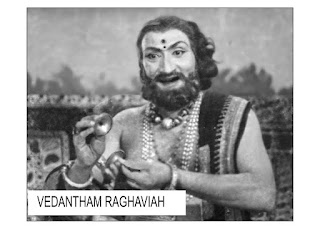Tale of two tales
Setting tales to music is something that happens naturally in our culture. Harikatha, Burra Katha, Villupaatu etc are loved even today. (Though that tradition has probably given way to film based 'light music' in many places. ) Such musical stories were told in films as well. We will examine two such songs which at the first view seem to be at the opposite end of the spectrum but are actually close cousins if we look at it from a different angle.
There are many musical tales present in old Telugu films. A couple of them which are very famous are the harikatha in the film 'Vagdanam' and 'Girija Kalyanam' from the film 'Rahasyam'. We will look at the second song here.
'Girija Kalyanam' is about Parvati's love for Siva, her desire to marry him, Manmada trying to entice Siva, Siva burning Manmada with his third eye, Rati pleading with Siva, Siva bringing back Manmada to life and then marrying Parvati.
Gantasala provides music for the lyrics of Malladi Ramakrishna Sastry. The words, music and the singing are brilliant. The important thing to observe in this song are how the rhythm, emotion, tune and ragas keep changing throughout. It is also important to note that while the song uses Carnatic ragas throughout without deviating much from their carnatic character, they don't sound cliched. Instead, Gantasala infuses a freshness in them which keeps you interested throughout.
Let's hear the song now.
The singers include Gantasala, Madhavapeddi Satyam, P.Susheela, P. Leela and A.P.Komala. We must remember this was recorded at a time when the option of recording was live recording. I have heard my friend say that Gantasala had many rehearsals before recording. As you can hear, the song has a chorus running throughout and it becomes a nightmare when you have to record such a lengthy song (close t4 mins) in one take.
Luckily for us, everyone is in top form. Malladi's lyrics are nothing short of top class and tell the story in a gripping form, Gantasala's tune and orchestration are inspired. The change of rhythm and the mapping of ragas are apt for the story. The chorus does a terrific job. The singers are all in their prime. Gantasala is precision defined. Have you heard a sweeter voice than the voice of Susheela that you hear here? She infuses so much melody in each of the raga that she touches.
Inspite of Gantasala and Susheela being in top form and being present throughout the song, it is Leela with just one paragraph to sing who walks away with the song. Wonderfully tuned in Saveri, Leela as Rati pleading with Siva to bring Manmada back to life, touches a chord in us when she goes 'pathi biksha prabhu'. Everything finally ends well for everyone with a mangalam being sung.
The next song I want to take up for examination may sound as if it is diametrically opposite to the song we just heard. It is a folk song which also tells a tale. The earlier song was classical in every sense. It had classical music and the lyrics are highly refined and classical. This song, on the other hand, is very raw. The lyrics are close to how the language is spoken The music is folk. The earlier song sang about the classical Gods while this song is about a village God. Yet, both these songs are same in spirit. Before I explain how, let us listen to this song from the film 'Virumandi'.
This song too is driven a lot by the chorus. Here too the singers, though unknown to many, do a terrific job. Muthulingam, who wrote the lyrics, keeps us engaged throughout. Ofcourse there is Raja. Unsurprisingly his grip on folk is sure and he keeps shifting the rhythms, tune and emotions with ease. Observe how casually the emotions change from one para to another effortlessly. The usage of raw voice gives it an authenticity to this song while the refined voices gave an authenticity to the earlier song. In their sticking to the genre faithfully, their inspired tuning, shiftig rhythms, wonderful storytelling and the great overall effect they produce on you, both songs are very close to each other than what the surface indicates.
It is indeed a tragedy that such songs don't happen often now. There was one attempt in the movie 'Kaviya Thalaivan' by A R Rahman called 'Alli Arjuna'. It is better we don't speak about it when we are speaking of these classics.




Comments
Thanks Suresh for the post.
Yes, Sri Sri wrote divine lyrics though he was an atheist. Similarly Arudra, who was also an atheist, wrote another lovely song on Rama, 'Sriramanalu Sathakoti'
Ravi